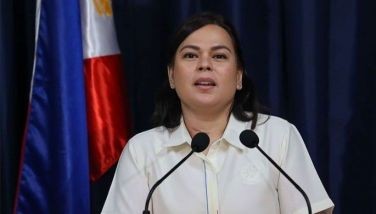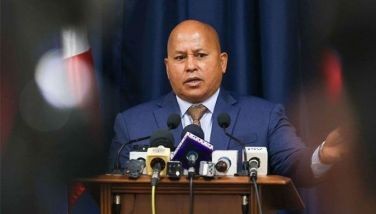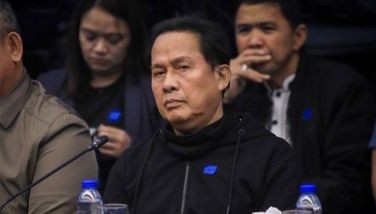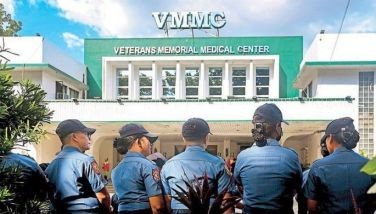Task force formed to probe AFP execs in P250-M scam
August 26, 2003 | 12:00am
The Office of the Special Prosecutor has started pursuing graft charges against several military officers and five private individuals accused of pocketing over P250 million in military pension funds after the Supreme Court ordered the case reopened.
Chief Special Prosecutor Dennis Villa Ignacio said they have formed a task force to consolidate 239 cases earlier filed in various courts against the military officers allegedly involved.
"There’s a move for the consolidation of the 239 cases because that’s physically impossible to prosecute. It means one witness will have to testify in all other cases," Villa Ignacio said.
Villa Ignacio could not immediately say how many officers may be involved, saying the Office of the Special Prosecutor is still putting together all the information on the accused.
In the late 1990s, government lawyers accused retired general Jose Ramiscal Jr., former chief of the Retirement and Separation Benefits System (RSBS), four other people and several military officers of misusing the pension funds.
However, in May 2000, the Sandiganbayan anti-graft court dismissed the graft charges after ruling that the RSBS was a "private entity."
Last week, the Supreme Court upheld the government’s appeal and reversed the Sandiganbayan ruling.
It ruled that the RSBS was a "government entity" and, therefore, the military pension funds were "public in nature."
"While it may be true that there have been no appropriations for the contribution of funds to the (RSBS), the government is not precluded from later on adding to the funds in order to provide additional benefits to the men in uniform," the Supreme Court ruled.
This indicated that the "character and operations of the (RSBS) are imbued with public interest," the high tribunal said.
The RSBS was created by Presidential Decree 361 during the Marcos regime. It manages the retirement and pension funds of soldiers, who, along with officers and enlisted personnel, are required to contribute four percent of their monthly salary to the RSBS.
The RSBS is administered by the Armed Forces chief through an agency, group or board, which he may organize, and, subject to rules and regulations that he may promulgate.
This is subject to the approval of the defense secretary while the military chief of staff has the discretion on where to invest the funds.
Meanwhile, retired policemen yesterday criticized the Department of Budget and Management for their delayed pensions and urged the DBM to speed it up.
"As of August there is no money for pensions," retired police officer Guillermo Domondon, president of the Philippine National Police Retirees Association, told reporters.
The pension fund is suffering a P1-billion deficit because the DBM set this year’s pension fund for 12,000 pensioners when there are 22,000 pensioners at present, Domondon said.
The over P1-billion pension fund allotted for police retirees was exhausted in July and the Philippine National Police now needs an additional P1 billion to fund the remaining six months of the year, he said.
Problems began when the task of handling the police pension fund was transferred from the PNP to the DBM, Domondon said.
"The problem is with the DBM but they keep pointing at the PNP. If they will always limit the number of pensioners under the GAA allocation, there will always be a problem. Why do they have to set a ceiling?" he said.
Unlike the military pension fund, the police retirement fund is not self-replenishing as active police officers do not make contributions to the fund.
Retired police officers are, therefore, dependent on the government to allocate money for the pension fund, to be released by the DBM.
Domondon said unless the delays are not corrected, retirees would constantly worry about late pensions. "There are some retirees who have died without enjoying the full pension benefits." –Mike Frialde
Chief Special Prosecutor Dennis Villa Ignacio said they have formed a task force to consolidate 239 cases earlier filed in various courts against the military officers allegedly involved.
"There’s a move for the consolidation of the 239 cases because that’s physically impossible to prosecute. It means one witness will have to testify in all other cases," Villa Ignacio said.
Villa Ignacio could not immediately say how many officers may be involved, saying the Office of the Special Prosecutor is still putting together all the information on the accused.
In the late 1990s, government lawyers accused retired general Jose Ramiscal Jr., former chief of the Retirement and Separation Benefits System (RSBS), four other people and several military officers of misusing the pension funds.
However, in May 2000, the Sandiganbayan anti-graft court dismissed the graft charges after ruling that the RSBS was a "private entity."
Last week, the Supreme Court upheld the government’s appeal and reversed the Sandiganbayan ruling.
It ruled that the RSBS was a "government entity" and, therefore, the military pension funds were "public in nature."
"While it may be true that there have been no appropriations for the contribution of funds to the (RSBS), the government is not precluded from later on adding to the funds in order to provide additional benefits to the men in uniform," the Supreme Court ruled.
This indicated that the "character and operations of the (RSBS) are imbued with public interest," the high tribunal said.
The RSBS was created by Presidential Decree 361 during the Marcos regime. It manages the retirement and pension funds of soldiers, who, along with officers and enlisted personnel, are required to contribute four percent of their monthly salary to the RSBS.
The RSBS is administered by the Armed Forces chief through an agency, group or board, which he may organize, and, subject to rules and regulations that he may promulgate.
This is subject to the approval of the defense secretary while the military chief of staff has the discretion on where to invest the funds.
"As of August there is no money for pensions," retired police officer Guillermo Domondon, president of the Philippine National Police Retirees Association, told reporters.
The pension fund is suffering a P1-billion deficit because the DBM set this year’s pension fund for 12,000 pensioners when there are 22,000 pensioners at present, Domondon said.
The over P1-billion pension fund allotted for police retirees was exhausted in July and the Philippine National Police now needs an additional P1 billion to fund the remaining six months of the year, he said.
Problems began when the task of handling the police pension fund was transferred from the PNP to the DBM, Domondon said.
"The problem is with the DBM but they keep pointing at the PNP. If they will always limit the number of pensioners under the GAA allocation, there will always be a problem. Why do they have to set a ceiling?" he said.
Unlike the military pension fund, the police retirement fund is not self-replenishing as active police officers do not make contributions to the fund.
Retired police officers are, therefore, dependent on the government to allocate money for the pension fund, to be released by the DBM.
Domondon said unless the delays are not corrected, retirees would constantly worry about late pensions. "There are some retirees who have died without enjoying the full pension benefits." –Mike Frialde
BrandSpace Articles
<
>
- Latest
- Trending
Trending
Latest
Trending
Latest
Recommended

































